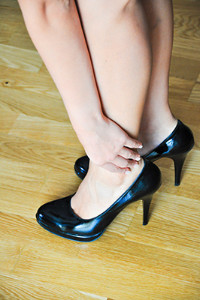159 North 3rd Street
Macclenny, Florida 32063
 Washington Nationals infielder Howie Kendrick recently tore his Achilles tendon in the first game of a doubleheader against the Los Angeles Dodgers. Kendrick was seen walking on crutches while wearing a walking boot in the Nationals’ clubhouse after the game. This is expected to be a season-ending injury for Kendrick and he states, “I really knew there was something wrong with it because I couldn't control my heel at all, so that's when I knew it was probably my Achilles.” He was immediately placed on the 10-day disabled list and was replaced on the roster by right-hander Jefry Rodriguez from the Nationals’ Double-A affiliate in Harrisburg.
Washington Nationals infielder Howie Kendrick recently tore his Achilles tendon in the first game of a doubleheader against the Los Angeles Dodgers. Kendrick was seen walking on crutches while wearing a walking boot in the Nationals’ clubhouse after the game. This is expected to be a season-ending injury for Kendrick and he states, “I really knew there was something wrong with it because I couldn't control my heel at all, so that's when I knew it was probably my Achilles.” He was immediately placed on the 10-day disabled list and was replaced on the roster by right-hander Jefry Rodriguez from the Nationals’ Double-A affiliate in Harrisburg.
Achilles tendon injuries need immediate attention to avoid future complications. If you have any concerns, contact Dr. John L. Coleman of Florida. Our doctor can provide the care you need to keep you pain-free and on your feet.
What Is the Achilles Tendon?
The Achilles tendon is a tendon that connects the lower leg muscles and calf to the heel of the foot. It is the strongest tendon in the human body and is essential for making movement possible. Because this tendon is such an integral part of the body, any injuries to it can create immense difficulties and should immediately be presented to a doctor.
What Are the Symptoms of an Achilles Tendon Injury?
There are various types of injuries that can affect the Achilles tendon. The two most common injuries are Achilles tendinitis and ruptures of the tendon.
Achilles Tendinitis Symptoms
Rupture Symptoms
Treatment and Prevention
Achilles tendon injuries are diagnosed by a thorough physical evaluation, which can include an MRI. Treatment involves rest, physical therapy, and in some cases, surgery. However, various preventative measures can be taken to avoid these injuries, such as:
If you have any questions please feel free to contact our office located in Macclenny, FL . We offer the newest diagnostic tools and technology to treat your foot and ankle needs.
 It is no secret that high heels are uncomfortable to wear for extended periods of time. However, if you choose to wear heels you should be aware of the consequences that wearing these stylish shoes may entail. Stress fractures are one of the most common injuries that may occur from wearing heels. If you accidentally turn your foot inward you may strain or break the ligament structures around the lateral side of the ankle; causing a lateral ankle sprain. Arthritis can also develop in those that wear heels too often. This is because you compensate while standing or walking in heeled shoes which causes the joints to wear down. In addition, heels have the potential to worsen your pre-existing foot conditions. For example, bunions can grow and become more painful when you wear heels compared to flat shoes.
It is no secret that high heels are uncomfortable to wear for extended periods of time. However, if you choose to wear heels you should be aware of the consequences that wearing these stylish shoes may entail. Stress fractures are one of the most common injuries that may occur from wearing heels. If you accidentally turn your foot inward you may strain or break the ligament structures around the lateral side of the ankle; causing a lateral ankle sprain. Arthritis can also develop in those that wear heels too often. This is because you compensate while standing or walking in heeled shoes which causes the joints to wear down. In addition, heels have the potential to worsen your pre-existing foot conditions. For example, bunions can grow and become more painful when you wear heels compared to flat shoes.
High heels have a history of causing foot and ankle problems. If you have any concerns about your feet or ankles, contact Dr. John L. Coleman from Florida. Our doctor can provide the care you need to keep you pain-free and on your feet.
Effects of High Heels on the Feet
High heels are popular shoes among women because of their many styles and societal appeal. Despite this, high heels can still cause many health problems if worn too frequently.
Which Parts of My Body Will Be Affected by High Heels?
What Kinds of Foot Problems Can Develop from Wearing High Heels?
How Can I Still Wear High Heels and Maintain Foot Health?
If you want to wear high heeled shoes, make sure that you are not wearing them every day, as this will help prevent long term physical problems. Try wearing thicker heels as opposed to stilettos to distribute weight more evenly across the feet. Always make sure you are wearing the proper shoes for the right occasion, such as sneakers for exercising. If you walk to work, try carrying your heels with you and changing into them once you arrive at work. Adding inserts to your heels can help cushion your feet and absorb shock. Full foot inserts or metatarsal pads are available.
If you have any questions please feel free to contact our office located in Macclenny, FL . We offer the newest diagnostic and treatment technologies for all your foot and ankle needs.